Interview with Cinco Paul
I talked with the writer of "Despicable Me" and showrunner of "Schmigadoon!" about the challenges of adaptation, the source of his writing inspiration, and what's the deal with those Minions.
In 2010, brand-new animation studio Illumination Entertainment released the film Despicable Me, and Hollywood has never been the same. The movies have been wildly successful, making history as the first animated franchise to cross $5 billion, and the characters (especially the Minions) have become globally ubiquitous. The screenwriting duo behind it all are Cinco Paul and Ken Daurio, two LDS filmmakers who had been working in the industry as writers on movies ranging from The Santa Clause 2 to Horton Hears a Who. Paul co-created and became the showrunner of the Apple TV+ show Shmigadoon!, which follows a regular couple (played by Cecily Strong and Keegan-Michael Key) who get stuck in a town where everything is a Golden Age Broadway musical. For me, it’s an all-time favorite… so I was excited to sit down with Cinco Paul for a wide-ranging discussion about his body of work. I hope you enjoy!
I want to start off by discussing a beloved children’s animated film that we all know and love that you wrote on– the 1997 film Cat’s Don’t Dance.
Starting from the very beginning! [laughs]
Well, I'm being a little facetious, but I do want to start from the beginning. I want to get a sense of what led you into screenwriting. And obviously, you've achieved these great heights, but what was it like trying to break into screenwriting?
Around the time I was in fourth or fifth grade, we got a Super 8 camera to shoot home movies with. And that was right around the same time I discovered the Marx Brothers, and had started to get really into movies, and classic comedies, and reading all about them. So I started making my own movies. And so from that time on, I was kind of making movies and writing them. But it was almost a secondary thing compared to music—I wanted to be a singer/songwriter like Paul McCartney. So that was the path I thought I was headed on, but it was always music or movies or something like that. I wasn't gonna be a life insurance salesman like my dad; that was never the path for me.
It came to a head when my wife and I were in North Carolina, where she'd been at med school, and the deal was always that after med school in North Carolina, we'd head to LA, and then I could pursue my music career. But at that point we were expecting a child, and she was a little wary. “You're gonna pursue a music career? What does that look like? How does that work?” I wasn't quite sure either, so I chose something that was much more stable: [laughs] screenwriting! But at least I could apply to film school, and if I got into film school, that would be a sign that maybe I could make a future for myself in the industry.
I got into USC, and then did two years at their Masters of Screenwriting program and had a great experience. And then through that, I got an agent. Well, it was a little more roundabout than that. I got a paid internship working at a production company, and they liked me, and they said, “When you're ready with your script, you can write your own cover letter, and we'll send it to all the agents that we know." So I did that, and a couple responded, but the one that I took a meeting with and that I really responded to was Frank Wuliger, who is still my agent to this day. I can't remember the exact order of things, but Cats Don’t Dance definitely came after I sold my first spec for a bunch of money in 1994, a year after I graduated USC. I sold that spec and it launched my career. It was called Band of Gold, and it was this screwball comedy about this doctor who's about to get married, and he's entrusted with the fiancée's family’s heirloom wedding ring. And he's holding onto it until the wedding, and then he accidentally sews it up inside a patient. And then, in his efforts to get the ring out of the patient, he and the patient fall in love, and comic hijinks and chaos ensues.
It never got produced. It’s one of my favorite things I've written, but the problem is that it did sell for a lot of money, and then they put more money into it. So for anyone to make this movie, acquiring the material would be costly—it’s pretty well buried. But I always say, if you ask many screenwriters what are their favorite scripts they’ve ever written, most of them are the ones that didn't get made.
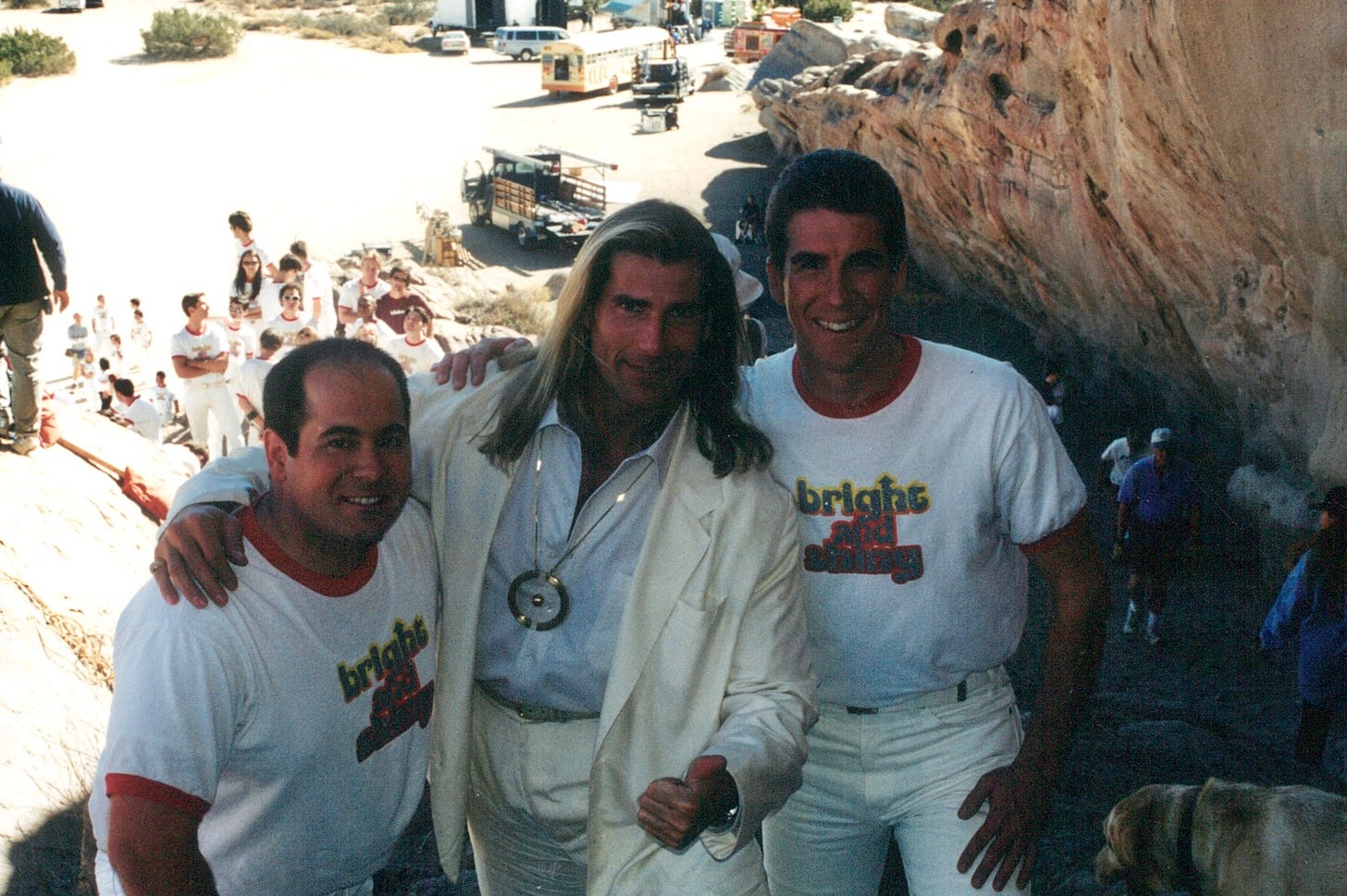
How did you find your screenwriting partner, Ken Daurio? What is that writing process like for you?
Well, I sold that script and had been working pretty steadily for several years, but nothing had gotten made. (Except for Cat Don’t Dance, but I just had an “additional screenplay material” credit on that.) But then I was asked to write for the Sesquicentennial celebration of the pioneers arriving in the Utah Valley, I was asked to write the music to go along with it. Ken was shooting music videos at the time for groups like Blink 182 and MxPx and Descendents and Kottonmouth Kings, [and he was] cast in the show. So we became friends through that. We would hang out after rehearsal, I'd be at the piano, we'd sing Beatles songs and stuff, and then he gave me a script that he'd written. And you know, it wasn't a great script, but it was really fun. I just really liked Ken, and we hit it off, and so I had an idea, and I said, "Here's my idea for a story; would you want to write this script with me?" And he said, "Sure." That was a script that never sold, but it got optioned, and it created quite a stir in town. And based on that, we got the meeting with the producer who pitched us the idea for Bubble Boy, which we wrote and sold to Disney, and then it got made! So finally, with this partnership, finally I got a movie made. Even though it was a massive critical and commercial failure, we got something made. So that was exciting. And basically, that's how Ken and I got together.
Then after Bubble Boy, because Disney liked us, they brought us on The Santa Clause 2, and when that got made, it was actually a successful movie! And so our career went on from there until we got picked by Chris Meledandri, who was at Fox Animation, to do Horton Hears a Who, and then that changed everything.
You wrote both Horton Hears a Who and The Lorax. What are some of the inherent challenges of adapting Dr. Seuss? It seems like a scary order to have to step into those shoes.
Yeah, the scariest thing is, these are picture books. They are short. There's not a lot of story in them. So you are forced to create and expand, and that is fraught, because you're inevitably going to have to change things that people love, or add things that Dr. Seuss did not add himself, and then people will turn on you. So it is risky, and it's just tricky in a narrative sense. What was nice about Horton Hears a Who was that it has a great three-act structure already built into the book. The Lorax, not so much. So with The Lorax, the decision was made that the book is Act 2. And then we created Act 1 and Act 3 on either side of it. So we'll keep [the core story] intact, but we're just going to expand on either side. And that was as successful or as unsuccessful as you may think.
This opens up a larger question about your writing style. It sounds like you're very much a believer in the three-act structure and writing your stories that way?
Yeah. Anyone who's worked with me will tell you I'm very tough on structure, and that's the first thing you have to figure out. I tell people, "Don't worry about the laughs. Don't worry about the comedy right now. We'll find a way to make it funny, but [first] we have to get a story that works.” That's the toughest thing, and that's why so many movies fail, is because of story problems. You have to build the story right. So the first thing I do after the initial idea is ask, will this work? Will this sustain for three acts into a complete story?
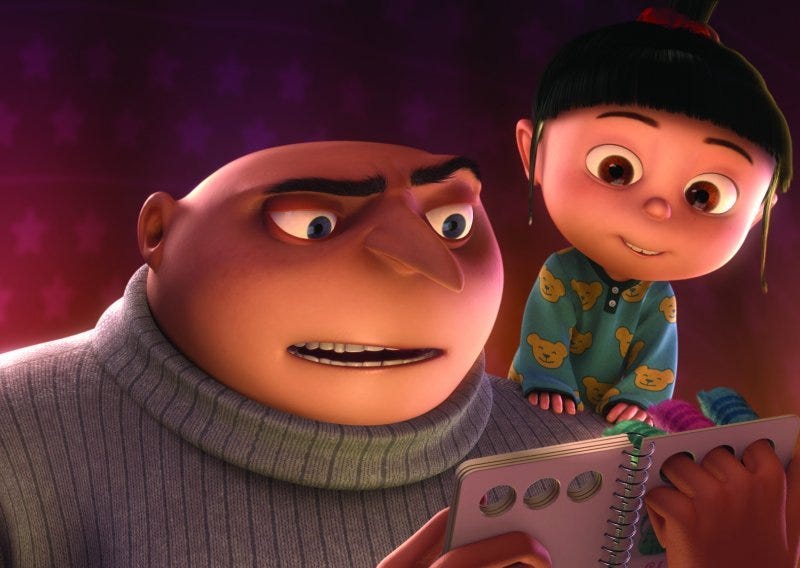
I want to jump ahead a bit, because we have to talk about Despicable Me and the Minions. What was the genesis of that idea? And how much influence did you have or did you not have on that ultimate design process?
None at all on the design. Ken and I wrote in the script that Gru had Minions. But our conception of them was sort of big, hulking, dumb monsters. And so then it was Pierre Coffin and Chris Renaud, who were the two directors, who came up with these little yellow pill-shaped guys in overalls and goggles. They came up with that complete design and the whole concept of the Minion, so we can't really take much of the credit… or the blame. In fact, when they were first [shown to us], we were just like, “What is this?” And then Pierre and Chris [Meledandri] fell in love with them and we worried, “Oh, no, they're gonna take over the movie.” And for us, it was really important that the movie is about Gru and the girls, not the Minions, so initially there was way too much Minions, and then it got pulled back to the right amount, I think. We were at first resistant, but then we realized these guys were really appealing and funny. And so we said, “Okay, we're in." Once we knew what they were, then we wrote for them. And then we would put them into scenes throughout the script, et cetera, et cetera.
You said the heart of Despicable Me is this relationship between Gru and his three girls. Where did that come from—what led you to that?
The original story of a villain adopting three girls so that he could pull off a heist came from this animator from Spain named Sergio Pablos. He had the idea, he had some illustrations, very different from how the movie ended up, but in some ways very evocative and suggestive of what the movie became. And so when Chris Meledandri pitched that idea to us, Horton wasn't released yet, but he knew he was going to leave Fox to form his own studio, Illumination. And he took us to lunch and said, "I want you guys to come with me and write all my stuff, and here's what I think should be the first movie." And we loved it. You know, I have three kids, Ken has three kids (at the time, they were much younger), and so we definitely related to that. And there's sort of a theme that's universal in that every guy has to get rid of the villain in him when he becomes a dad. And your kids gradually wear down the villain in you, you know? And so it really became, up to that point, the most personal thing that either of us had ever written, even though it's this fantastic story of a supervillain and Minions and all these gadgets and things. There's a scene where Gru reads a book to the little girls called “Sleepy Kittens.” And that was 100% based on this book called “Five Little Bunnies” that my two girls always wanted me to read, and I thought it was the stupidest thing in the world, but it had puppets. And so that's why they loved it. So much of it came from our personal experiences, as dads.
The wildly catchy song “Corn Puddin’” from season one of Schmigadoon! won the 2022 Emmy Award for Outstanding Original Music and Lyrics.
Let’s turn to some of the stuff you've done more recently. I want to talk about Schmigadoon!, which I love; anyone who can rhyme “Chicago” with “fantastical farrago” is top tier in my book. It's clear you have a deep love for musical theater. Was there a favorite show you can recall that cemented that love for you?
My mom loved musicals, and so she had several cast recordings—most notably, South Pacific and Camelot. We would listen to those all the time when I was growing up, and I really loved Camelot so much as a little kid. I didn't know what it was. I just knew the songs, so I was picturing King Arthur and all that in my head. But then there were two movies I saw that really changed me: Singin’ in the Rain was one. I saw it early on, and I remember being blown away by Donald O'Connor's number. And then I saw the movie Oliver and boy, did I love those songs. I wanted to be the Artful Dodger. I would try to sing “Consider Yourself” in my little eight-year-old British accent all through the house. Those are the ones that really impacted me, and there's a little of both of those in Schmigadoon! season one, and certainly a lot of the other shows that my mom exposed me to when I was young.
Tell me a bit about the balancing act of treating these iconic musicals with respect, which you clearly do, while also poking some fun at them.
The example I used in the writer's room was, this has to come from love. It has to. Like, we will be way off course if it doesn't. So I said that on the first day. But that doesn't prevent us from pointing out things that are stupid or problematic or corny. It's kind of like the relationship you have with your parents: you love them, but still, they do things that make you cringe or make you roll your eyes. And so it always came from that sort of place. I'm not here to take musicals down, but we're here to poke fun at them a bit as we celebrate them.
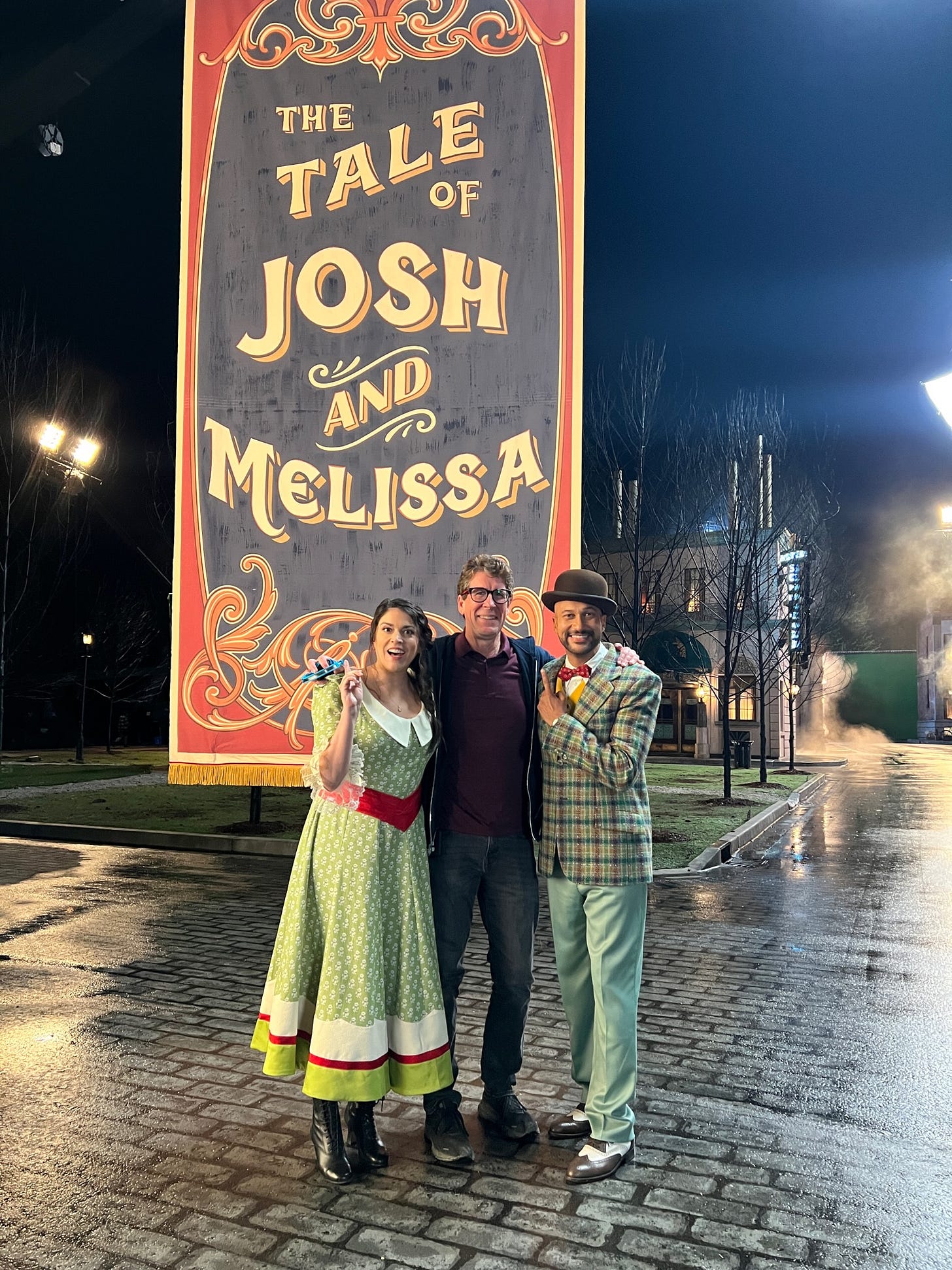
Is there a Schmigadoon! song that you consider underrated? Like, you wish it had more big fans, and it has a special place for you.
Boy, that's such a good question. No one's asked me that question.
This is your chance, man.
I know! Um… It always has surprised me that some of the songs get a bigger response than others. A couple of these are so tied to the performance, but I think “Maybe It's My Turn Now,” the song I wrote for Cecily Strong to sing in season two. I thought it would become a cabaret staple or something, you know? And it hasn't quite, but Cecily sang the heck out of that one. And so that's one that has a very special place for me.
And then Ariana Debose's song in season two, “Over and Done,” which I wrote specifically for her. It’s in the last episode, it's her big Dreamgirls-like song. I think it is one of the better songs in the show, and maybe hasn't quite gotten its flowers yet, even though Ariana just gives an amazing performance. I remember it on the set, because we have the singers sing live—it's so much better than lipsyncing, it gives a better performance and it's a better sound, it doesn't look fake—anyway, it was at the end of a long shoot, and we were shooting six days a week. It was grueling. People were tired and maybe getting a little cranky, and then Ariana came in, we had her there for two days, and she sang this song and you could just see the impact it had on the whole crew. Everyone just thought, "Oh, wow. This is something.” It was the jolt of energy or musical theater love that we needed to power through the last couple weeks. It was amazing to see how it transformed everybody.
In my opinion, we were robbed of a third season of Schmigadoon!, and if you check out the Internet, many people feel the same. But how much had you prepared, written, or composed before you learned there wasn't going to be a season three?
It was all written. All six episodes were written, and I'd written 25 songs. And so they're all sort of sitting there, but there's talk of maybe doing a concert presentation of it. I would love to get it out there, because that's obviously a lot of work. We did a special hour-long reading singthrough for Apple as a last-ditch effort to get them to say yes. So then I got to hear Cecily and Keegan and Jane and Kristin and Aaron and Ariana, and they all came, it was like “Avengers assemble” because they all love the show and they wanted it to continue. And so I got to hear them do all the songs, and I really wish other people could too.
I feel like someday they will. And I have hopes. You've heard I did a theatrical stage adaptation of Schmigadoon! And we did a performance at the Kennedy Center, and now we're heading for Broadway, and my hope is that maybe that will expand our audience and increase the excitement around the show, and then maybe someone will want to do that season three. Because it's ready!
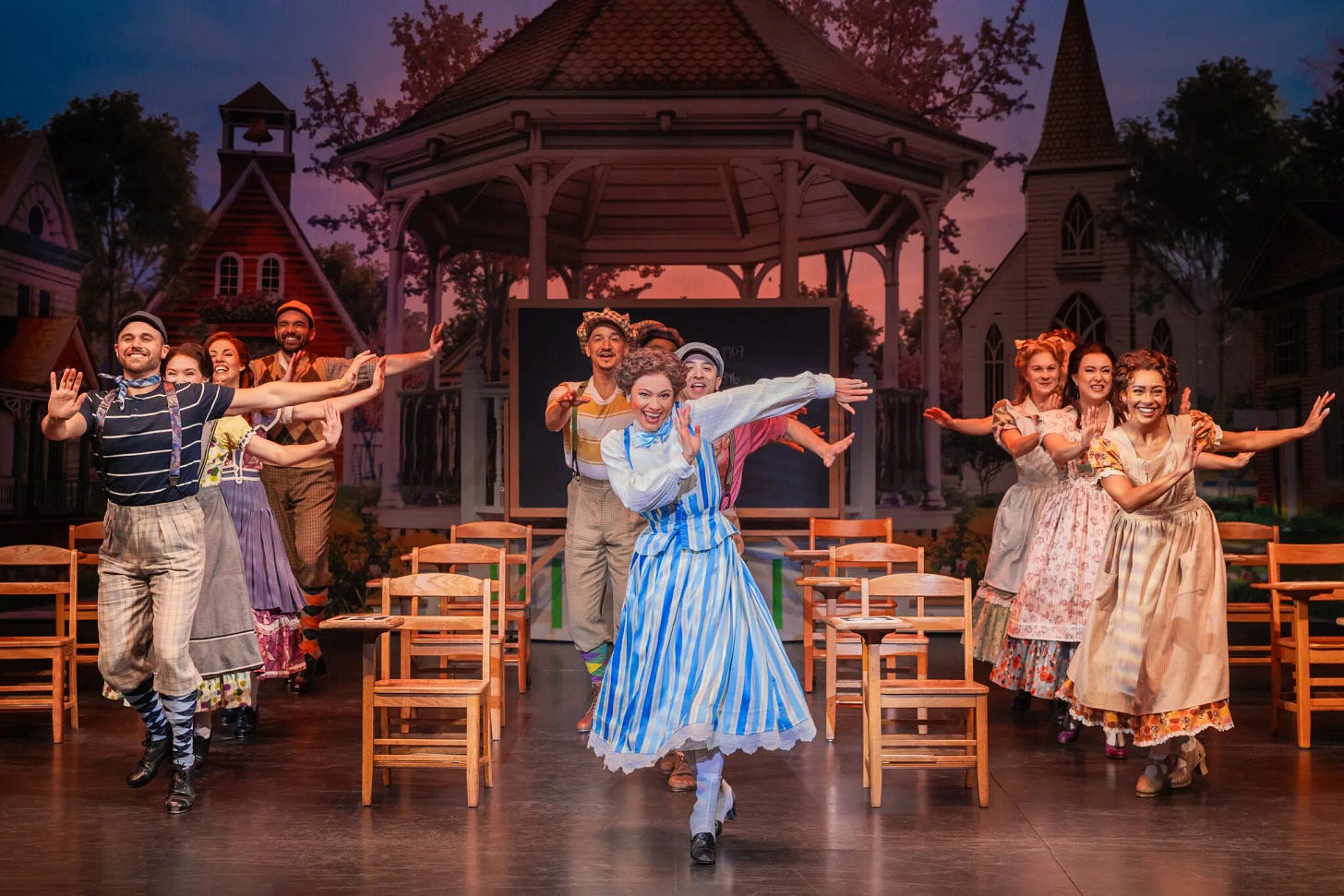
I want to back up to discuss the shows and films and things you've worked on. Is there a character that feels the most personal to you, that you've put the most of yourself into?
There’s so much of me in Melissa's character in Schmigadoon. And so much of my relationship with my wife is in that Josh/Melissa relationship. So many of those flashback scenes from season one were actual things that we experienced. In so many ways, Schmigadoon is the most me and the most personal thing I've ever done. And really, it's the only thing that was my own idea of mine that's ever gotten made. Everything else was an adaptation or somebody else's idea, you know? And so by far I’d say that's the most personal, but there's little bits of me in everything. That's what you do as a writer, right? You kind of find a way to imbue the characters with your own experience and feelings, and then you also try to inhabit them. So you're feeling what they're feeling.
How has your faith informed your writing? Or how do you approach that in your work?
It's informed my writing in that all of my work is fairly optimistic and hopeful. And that may be from my faith, but it also just may be the way I am because I know there are people of faith who are not that optimistic and hopeful. But certainly, I feel that's a part of it. If you look at the things I've written, a lot of them are about the power of love to make us better people. And to me, that's the message of the gospel, right? I think that's what it's all about, ultimately. So in that sense, you can say it's in everything. But it's also in It’s a Wonderful Life, you know? I feel like everything I've done has been very influenced by It's a Wonderful Life. I've told my agent so many times, I think I just keep trying to make my own version of It's a Wonderful Life in everything I do.
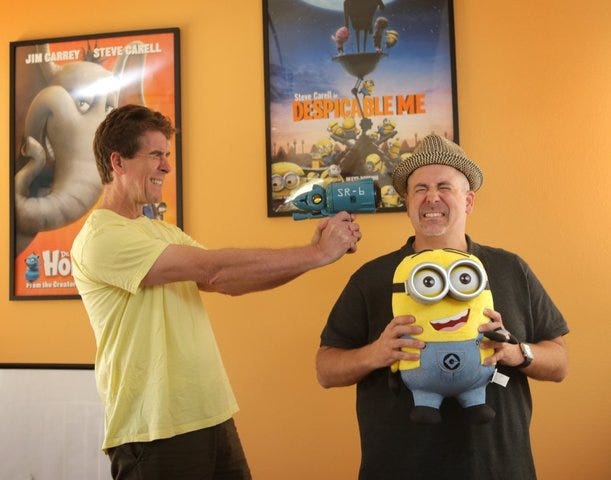
You wrote a really really thoughtful and touching piece in the Salt Lake Tribune about dealing with loved ones who have left the church. How did that come about? What was that main idea that you wanted to convey?
It was me experiencing my kids leaving the church, choosing not to participate in church anymore, and I was sort of struggling with that and thinking a lot about it, and then I realized, so many people I know are dealing with that, you know? The Internet really changed things, and the church is hemorrhaging young people. And I felt like no one ever talks about this. Why does no one ever talk about this? Where is the help for the people who are struggling with this? And so when I was asked to give a talk in my ward, I said, “This is what I’d like to talk about." So I gave that talk and it had a big impact, and then I gave it in my New York ward, and I probably had 30 requests for copies of it. I felt like it was striking a chord with people who would say, “I'm so glad you talked about that. Nobody talks about this.” And so Jana Riess, who's a friend, runs this blog called Flunking Sainthood, and the Tribune usually picks up those pieces. I was doing an interview with her, and I mentioned this talk, and she said, "Oh, my gosh, could you send it to me?" And then when she read it she said, "Would you be opposed to publishing that?” And it felt right.
So that's where it came from, really. And the response has been very positive, so I'm happy that it's helped people, because I’ve made total peace with my kids leaving. I had sort of seen the writing on the wall. I knew it was coming, and so I'd kind of steeled myself for it, but still... I wanted to share what I've learned. I've seen people where it's ruined their relationships, and then they treat their kids differently because of it. Or their family members, whoever it is, and I think that's not what the gospel's about.
You noted in that piece that you don’t believe in “sad heaven.” What did you mean by that?
I mean, I don't think heaven is sad. So if I were separated from, could never see my kids again or something like that, that would be sad heaven. I don’t think that's what it is. There's no way that heaven can be that. And I think for a long time, some people have thought that that's what that means, and that's what the gospel says, but I think we're misinterpreting things. And I think there's so much more mercy going on, and grace. And I think there are people who are drawn to the church because they love the justice part of it, and I mean, I think justice is okay, but there's a higher law. And that's how I choose to live my life. I would rather demand mercy than justice!


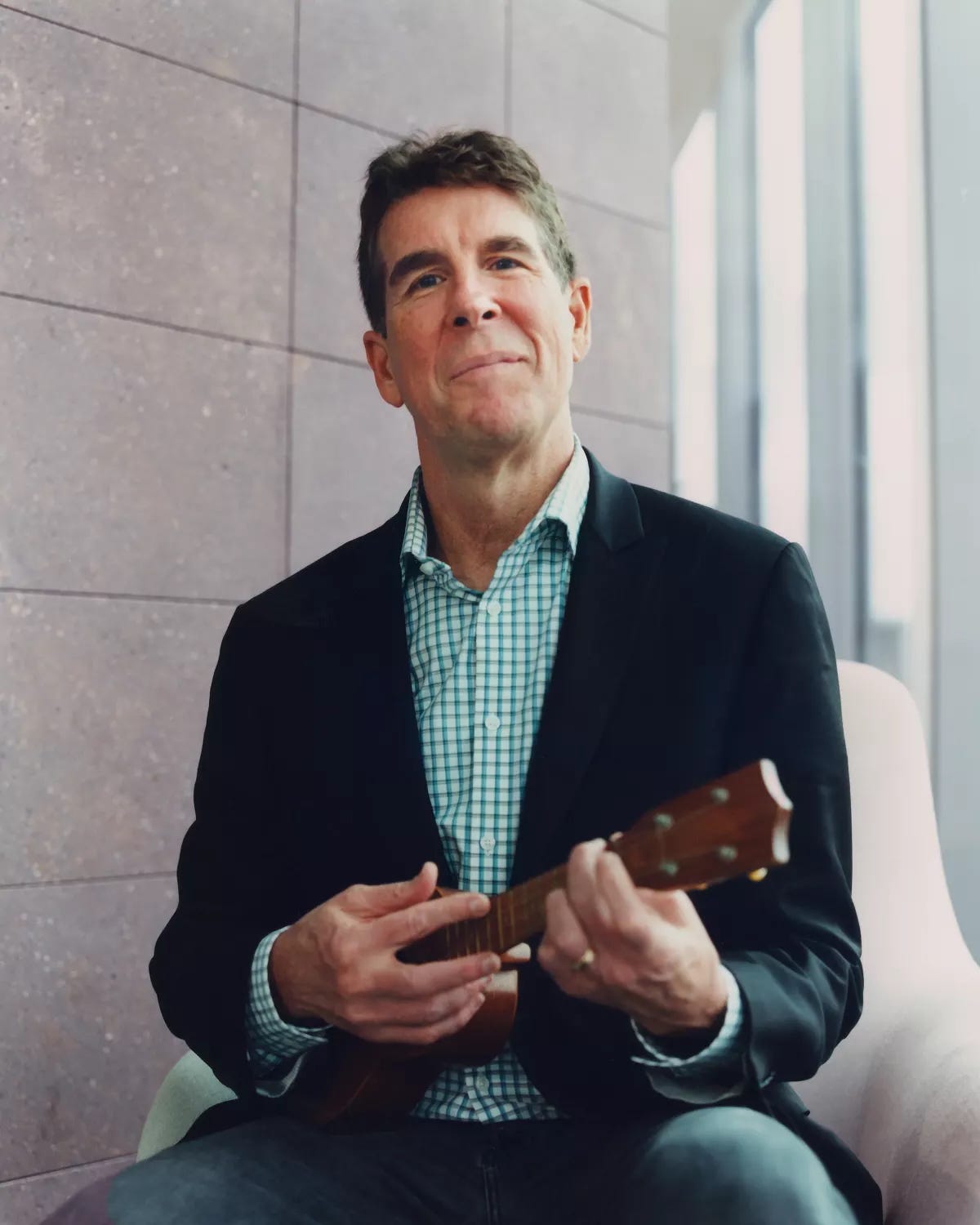
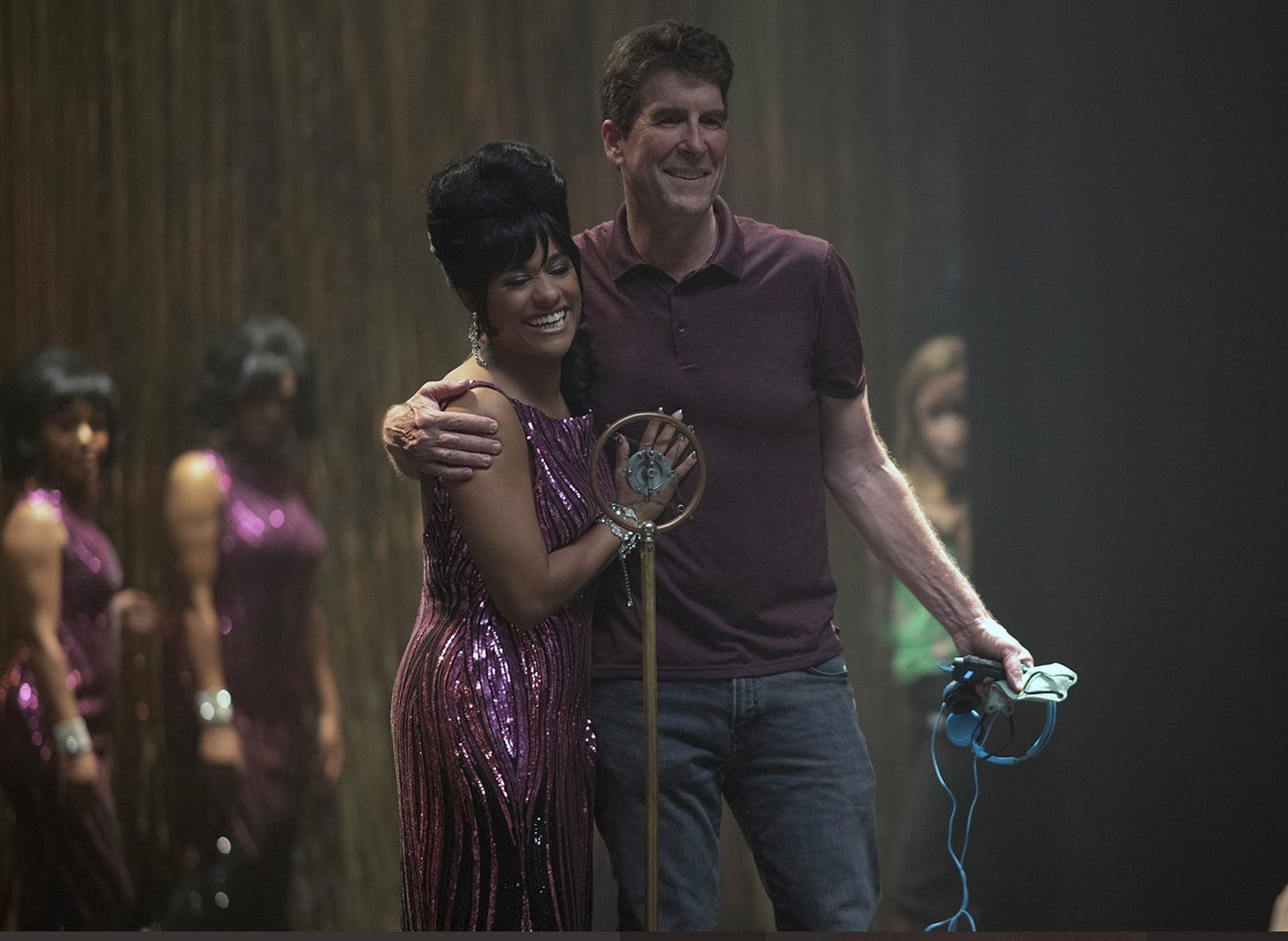
I LOVE SCHMIGADOON AND SCHMICAGO WAS ICONIC AND SCHMIGA (PHANTOM X LES MIS) WOULD HAVE BEEN LEGENDARY.
This dude is awesome. Also Bubble Boy was one of my favorites!! I'm obviously super impressed and in love with many of his bigger commercial successes (his resume is incredibly impressive) but these fun ones are where he probably gets his own voice out more because of less beaurocracy.
As a longtime fan of Schmigadoon, I loved learning more about the extremely talented Cinco Paul. Great interview!